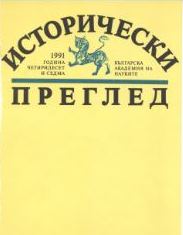Кризисни явления в БРЦК през лятото и есента на 1872 г.
Crisis Phenomena in the BRCC in the Summer and the Autumn of 1872
Author(s): Krumka SharovaSubject(s): History, Political history, Modern Age, 19th Century
Published by: Институт за исторически изследвания - Българска академия на науките
Summary/Abstract: In the article a study is made of the processes within the BRCC and especially in the committees inside Bulgaria in the summer and the autumn of 1872, i. e. before the Arabakonak raid. An analysis is made of the results of the comprehensive campaign of revolutionary terror launched by Vassil Levski at that time because of the urgent need to raise money for purchasing arms, when it was established that it was impossible to get the money from the rich Bulgarians, on whom the BRCC had made an appeal to grant it some in March 1872. The raids on wealthy “tchorbadgi” and other rich Bulgarians exposed the organization to danger, besides the desired goal – raising funds for arms, was not achieved. It created tensions in the committees and, on the other hand, attracted the attention of the Turkish authorities to the committees which were busy in carrying out vigorous activity. Besides there was a tendency of decentralism and a strife for independent action in the internal revolutionary organization set up by Levski in 1870–1872 along with a keen desire to enroll more people for organizational work, thus speeding up the preparation for the uprising. These tendencies ran counter to the two opposing principles on which the relations between the leaders of the BRCC in the country and the local committees were based – centralism and respect for the opinion of the majority. All this created a lot of difficulties in Vassil Levski’s work during the period under consideration. Thus even before the disruption after the Arabakonak raid problems and contradictions accumulated in the committees in Bulgaria which can be defined as crisis phenomena. The situation worsened as a result of the activation of an external factor – the Ottoman administration and Midhad Pasha’s taking up the post of Grand Vizier. He was known for his “strong hand policy” aimed at doing away with the Bulgarian liberation movement. The author dwells in detail on this problem in another article of hers.
Journal: Исторически преглед
- Issue Year: 1991
- Issue No: 3
- Page Range: 3-24
- Page Count: 22
- Language: Bulgarian
- Content File-PDF

